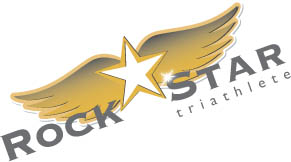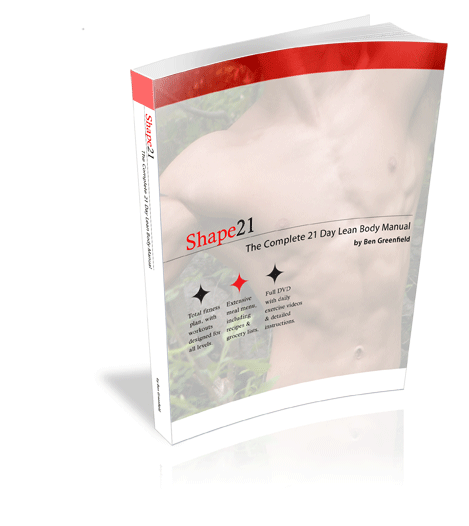December 23, 2009
Click here for the full written transcript of this podcast episode
This December 23, 2009 free audio episode features the following topics: more talk about good fats, all about gluten, ideal body weight for triathlon, corn syrup vs. high fructose corn syrup, brain-boosting supplements and how to use quinoa. But before you go any further in the shownotes…check this out…
 For the next 4 weeks, the podcasts from Ben Greenfield Fitness will primarily focus on “Listener Q&A's”, due to Ben's undertaking of a huge triathlon-focused side project that is going to bring you over 12 free live teleconferences with triathlon pros and coaches over the next 6 weeks! For more information on that project, and to stay in the loop on what's going on with that project (called the Rock Star Triathlete Academy) simply go to http://www.rockstartriathlete.com.
For the next 4 weeks, the podcasts from Ben Greenfield Fitness will primarily focus on “Listener Q&A's”, due to Ben's undertaking of a huge triathlon-focused side project that is going to bring you over 12 free live teleconferences with triathlon pros and coaches over the next 6 weeks! For more information on that project, and to stay in the loop on what's going on with that project (called the Rock Star Triathlete Academy) simply go to http://www.rockstartriathlete.com.
—————————————-
Listener Q&A:
Do you have a question for Ben? Just click Ask a Podcast Question at the bottom of this page and leave a voicemail, leave a Skype voicemail to username “pacificfit”, or e-mail [email protected].
Listener John asks: “Ben, A friend of mine recommended that I email you with a problem I have. My wife has been diagnosed with rheumatoid arthritis at 39 years of age. She has a real problem with working out and exercising, if she could work out 10 days a week… she would. The arthritis is in her right hand index finger and beginning to spread to her wrist. She is very upset because working out with weights is painful, riding a trainer or spinning is painful and many pilates moves and yoga moves can't be performed due to her range of motion. The only thing she has left is running.
There is a secondary underlying issue… We are trying to conceive as well and most of the drugs the doctor will prescribe cause birth defects. Can you supply and help at all with supplying some homeopathic remedies and other exercises that will circumvent the pain generated by other exercises in her hands and wrist. I feel awful for her because exercise is such a huge part of her life. She is an incredible athlete and loves a healthy lifestyle.”
Listener Todd asks: “My prime focus right now has been to work on enhancing recovery, staying healthy and reducing injury. I’m doing several things differently this season, and I’d love to hear any other suggestions from the triathlon community. After hard workouts, I immediate fuel with whole food carbs and protein (something I’ve never done before, as I’m usually not hungry after a hard effort). I use a topical Magnesium spray (5 sprays per appendage) that I leave on for 15 mins, and then shower. Once per week I also have an Epsom salts bath to increase Magnesium absorption. I usually take a Recovery day on Fridays, but I move it up in the week if I’m tired or sore. During this day, I do a stretching session with a roller, focusing on my IT band, piriformis and SI joint which can tighten up. I also pay close attention to nutrition, choosing as many anti-inflammatory foods as possible. I think in the past, inflammation has been my prime source of injury and lack of recovery. Finally, a number of supplements have significantly impacted my ability to recovery and stay healthy. I use a salt solution from Himalayan Crystal Salt first thing in the morning, and 5 drops of Oil of Oregano under my tongue before bed. Lastly, I am taking Flax Seed oil (in capsules), a Green Food supplement and 5000 U.I. of Vitamin D every day with my breakfast. Since using this protocol, I have not been sick once and am sleeping very soundly. Currently, my training hours equal about 6-8 hours per week. I complete 2 High Intensity training sessions per week and am able to recover. I am wondering if I will still be able to recover well once I ramp up to 12-14 hours per week. Is there something more I can do? My only fear at this point is burn-out or injury due to the increased intensity so early in the season. Right now I am simply paying attention to what my body is telling me, and mixing in a recovery day when I feel a bit sore or tired. Do have any other recommendations to ensure I don’t become overtrained or increase my chance of injury?”
Listener Chuck asks: “One question I have is I would like to be more competitive at Ironman but I'm 5'9” 180 lbs and have 14% body fat. If I keep my bone and muscle mass and try to get to around 10-11% body fat (which for a 44 year-old seems pretty low) I'm still at 175 lbs. That just seems too heavy. The number that floats around in my head for a racing weight is 165-168, but I don't know if losing muscle in order to get to that weight will pay off in a lower body weight. Do you have any quick thoughts on that?
Here's a question as well– I was eating a Balance bar the other day in a pinch for a snack, and when looking at the ingredients it had “corn syrup” in it. Is there a difference between corn syrup and high fructose corn syrup, and if so, is one better or worse?
Another question; In preparing for a half Ironman, what kind of a time table should I look for to begin my specific training? Like how many weeks out will I need a regimented plan?”
Listener John asks: “Are you familiar with nootropic products? Enhance the dopaminergic system and acetylcholine function in the human body. Involves motor skills, mentation, cognition, reward and drive – movement, reaction time and communication between cells. Do you have any experience with this type of supplement?”
 Listener Chris asks:
Listener Chris asks:
“1) I Just bought an order of the 120 count MAP supplement, before realizing that the recommended dosage is 5 capsules, and before I heard that I may need to take as many as 10-20 capsules/day. My question is how I might be able to strategically use this bottle, as I'm a fledgling musician, a couple years out of college, without a “real” job, and without the financial means to buy a bottle a month or so. The aspect of this product that convinced me to buy it was to help with a nagging hamstring injury I have been dealing with, which has been preventing me from doing the running I'd like to do. I'd like to start doing triathlons in 2010 for fun, but I am mainly concentrated on competitive cycling, with high hopes to try out for the US Paralympic cycling team(Brachial Plexus Palsy in the left arm). Should I use the product to maximize my fitness to continue my training immediately, use it minimally over time to spread out the use, or save it until racing season officially starts in a few months?
2) My next question is about Gluten. Is there a compelling reason to consider eating gluten-free foods if you are not resistant or intolerant to gluten?
3) Lastly, could you share the recipes that you use for quinoa in greater detail? I just started eating it, and I love it, but I have only boiled it up, and used it as a side with dinner after a hard workout. You have referenced eating it in several situations throughout the day, but I was wondering if you could be more specific on how you prepare it.”
————————————
That's all for this week! Remember, if you have any trouble listening, downloading, or transferring to your mp3 player just e-mail [email protected]. And don't forget to leave the podcast a ranking in iTunes – it only takes 2 minutes of your time and helps grow our healthy community! Just click here to go to our iTunes page and leave feedback. Upcoming episodes include expert interviews on Liquid Vitamins, and Optimizing Biomechanical Movement Patterns During Exercise. Finally, remember all the time put into producing this podcast for you, and consider donating to our show, we’ll throw in a free T-shirt or your choice of any of the BenGreenfieldFitness active singlets, hoodies and hat pictured below and available in our new store.


Ben,
You mentioned how you recorded this at your desk drinking your cup of coffee–could you talk a little bit about coffee drinks. Which are good and which would be bad for health. I would assume black coffee would be good, but a vanilla latte from Starbucks would not be. But what about just a straight latte with skim milk–would that be “healthy”? Thanks!
6’3″ 175
Hey Ben,
Just curious, what is your height and weight? Thanks!
Ben, I’m a little surprised that you didn’t mention dietary changes for “listener #1” and her rheumatoid arthritis. As you know, RA is an autoimmune disease. I personally know someone that had positive markers for lupus. She gave up gluten and those markers are no longer positive. I realize that lupus and RA are different but it is my understanding that there are improvements for many (not all) RA sufferers that start a gluten free (and perhaps caseine free) diet.
good point! Perhaps I was a bit too focused on the “homepathic remedies” and “exercises” part of the question to see the forest for the trees!
Hey Ben, thanks for answering my question on recovery this week. Yes, I think it’s safe to say that I’m drinking the bengreenfieldfitness.com Kool-aid (without the sugar, of course…). I will add your suggestions to my recovery protocol. As a follow-up, I am following your “Holistic Fueling for Triathletes” for my nutrition, with great results. I’ve even convinced my family to go with a quinoa stuffing for Christmas dinner! I’m looking forward to leaping into 2010, healthier than I ever have been at this time of the year. Thanks, and happy holidays.